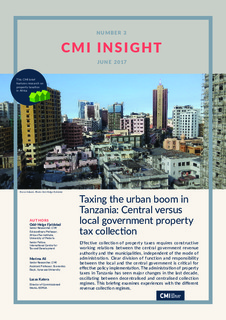| dc.contributor.author | Fjeldstad, Odd-Helge | |
| dc.contributor.author | Ali, Merima | |
| dc.contributor.author | Katera, Lucas | |
| dc.date.accessioned | 2018-01-04T08:23:13Z | |
| dc.date.available | 2018-01-04T08:23:13Z | |
| dc.date.issued | 2017-06-01 | |
| dc.identifier | oai:www.cmi.no:6260 | |
| dc.identifier.citation | Bergen: Chr. Michelsen Institute (CMI Insight 2017:3) 8 p. | |
| dc.identifier.issn | 2535-3446 | |
| dc.identifier.uri | http://hdl.handle.net/11250/2475391 | |
| dc.description.abstract | Effective collection of property taxes requires constructive working relations between the central government revenue authority and the municipalities, independent of the mode of administration. Clear division of function and responsibility between the local and the central government is critical for effective policy implementation. The administration of property taxes in Tanzania has seen major changes in the last decade, oscillating between decentralised and centralised collection regimes. This briefing examines experiences with the different revenue collection regimes. | |
| dc.language.iso | eng | |
| dc.publisher | Chr. Michelsen Institute | |
| dc.relation | CMI Insight | |
| dc.relation | 2017:3 | |
| dc.relation.ispartof | CMI Insight | |
| dc.relation.ispartofseries | CMI Insight 2017:3 | |
| dc.relation.uri | https://www.cmi.no/publications/6260-taxing-the-urban-boom-in-tanzania | |
| dc.subject | Property Tax | |
| dc.subject | Tax Administration | |
| dc.subject | Tax | |
| dc.subject | Tanzania | |
| dc.subject | Kinondoni | |
| dc.subject | Ilala | |
| dc.subject | Temeke | |
| dc.subject | Dar Es Salaam | |
| dc.title | Taxing the urban boom in Tanzania: Central versus local government property tax collection | |
| dc.type | Report | |
